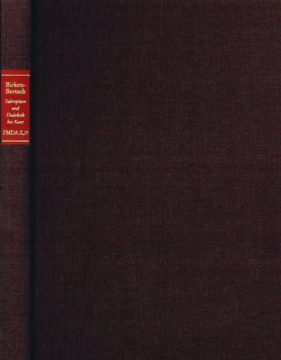›Subreption and Dialectic in Kant‹ has two goals. In the first place, it traces the history of the concept of subreption up to the philosophy of Kant. Secondly, it investigates the relation between Kant‹s thesis that there is a dialectic of reason and the doctrine of subreption. – In Roman law, someone commits a subreption when he attains an advantage through the concealment of important facts. In philosophy the concept of subreption is deployed from the time of Jungius and Leibniz (using the Latin term »vitium subreptionis« or »error of subreption« in order to criticize methodical errors in philosophical argumentation. In the first half of the eighteenth century, Christian Wolff applies the concept to errors in the empirical verification of statements. The peak of the development of the concept is Kant‹s Dissertation of 1770, in which the chapter on the method of metaphysics centers on how to avoid the »vitium subreptionis metaphysicum«. In the Transcendental Dialectic of the ›Critique of Pure Reason‹, Kant overlays the critique of subreption with a theory of dialectical reason. Yet reason does not appear to be the source of this dialectic. We are therefore left with subreption – a failure of judgment – as the only way of explaining the errors considered in the Transcendental Dialectic. – This work provides the first investigation of the concept of subreption. At the same time it demonstrates the great importance of the concept for the elaboration of Kant‹s philosophy.
- Veröffentlicht am Freitag 1. September 2006 von frommann-holzboog
- ISBN: 9783772823763
- 208 Seiten
- Genre: Aufklärung, Hardcover, Philosophie, Renaissance, Softcover
